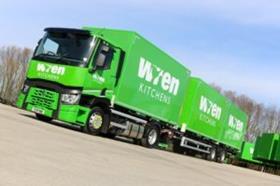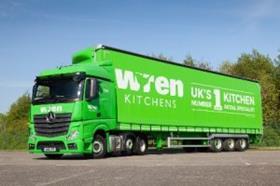It’s a measure of Wren Kitchens’ success that when MT catches up with head of transport operations Lee Holmes for a chat, he’s busy planning the company’s expansion into the US.
After all, this is a retailer that only celebrated its 10th anniversary in 2019, but by then could boast a turnover of £643m and gross profit of just under £300m.
Winner of the 2020 Business Excellence Award, Holmes says Wren’s success can be put down largely to owning its supply chain: “We make our own kitchens, sell them and deliver them,” he explains. “Not a lot of competitors do the delivery; it’s what makes us as good as we are – the final mile. And being a relatively new company we can define our own strategy and take the best pieces from the industry’s leading companies.”

One idea that Wren hasn’t borrowed from a rival has been triple-trunking. It might sound like a variety of chocolate chip cookie, but it’s actually involved ditching most of the company’s van fleet in favour of demountable box bodies pulled by one 18-tonne truck. Each box can hold as many as three large kitchens, helping the company reduce mileage, fuel usage and manpower.
“We’ve always been an advocate of the demountable swap body system,” Holmes says. “It reduces double handling and cross-docking and the kitchen arrives to the customer straight off the production lines. We no longer had issues with weight capacity on the van fleet – we just couldn’t get a decent payload for our operation. So that led us to the 7.5-tonne options. We already knew the demountable benefits from our 18-tonne fleet.”
What this means is that Wren can now move the right number of products and still be economically viable when compared with a traditional van operation. It’s also boosted its green credentials. “Road trains are the way forward for us,” Holmes says. “It’s a unique operation and probably isn’t suitable for all businesses, but for us and the customer it fits like a hand in a glove.”
Unforeseen benefits
Triple-trunking has also provided some unforeseen benefits, such as a reduction in accidents. Unlike vans, HGVs require a trained driver and are more closely monitored by telematics to monitor performance. Training can therefore be quicker and more targeted.
“We’ve also noticed safer driving styles,” Holmes says. “With a van you always have the temptation to speed a little more. The HGVs can be altered to change the user’s driving style.”
Holmes applauds government consultation on the wider use of longer semi-trailers on Britain’s roads: “Other countries do it but it’s almost like we accept the traditional method,” he says. “If a longer trailer can reduce the traffic, has fewer emissions, less chance of accidents and is a cheaper solution, there’s no downside.”

But like many firms, Wren finds it difficult to locate good drivers. So instead, it develops them itself. It’s even launched its own driver apprenticeship programme.
“It’s very easy to get someone to steer a truck from A to B – but you will be very lucky if you manage to find one who doesn’t smash up the truck or cause issues,” he says. “A good driver is hard to find and even more so where the role involves a lot of manual handling. There comes a time in a driver’s career when they don’t want to be lifting heavy items all day.
“We’re lucky our operation requires a driver and a driver’s mate. This presents a great opportunity to give those who really want to fit with our values a career. It’s much easier to spend a few thousand pounds training someone who is eager to learn and getting a good five years’ loyalty back than it is to get your fly-by-night guys who move from agency to agency, breaking the drivers’ rules and just trying to get by doing the minimum.”
National scandal
Holmes describes the industry driver shortage as “one of the biggest national scandals around”, suggesting people working in gyms, bars and the hospitality sector should be given a bursary to train in the industry, with a small tax on their earnings to cover it.
He insists this would take the strain from the welfare system, pumping much-needed blood into a declining labour pool, while giving people the chance to develop and grow: “And it’s not only the driver shortage – there’s also a shortage in highly skilled and dedicated management; these people are often paid less than their driver counterparts so the natural instinct is to stay driving.”
But he agrees that drivers are simply not paid enough to make the job attractive. “It’s not worth the money being a professional driver when I can go into the warehouse and only earn a pound an hour less,” he admits. “There’s a risk of being liable for something that goes wrong on the road.”
He also argues that the DVSA’s refusal to allow testing to be performed by outside bodies during the pandemic hasn’t helped attract drivers.
“The DVSA is a typical government department,” he says – “outdated, run by people who are disconnected from the general workplace and basically not fit for purpose. In a normal industry they would be overtaken by an innovative company that understands what the sector they’re in requires.”
Follow the leaders
Companies that inspire him include DPD – “the benchmark” – and Amazon, whose own US expansion he’s keeping a close eye on: “I love how they take the whole process back to the beginning and re-define it – it may be that no one else is doing it, but that doesn’t stop them. Simple is beautiful.”
In the early stages of the lockdown, Wren furloughed many of its staff, but the company has continued investing, looking to gain an advantage over rivals who often subcontract their transport and cut training to save money.
“You can have a lower bottom line by stripping things out, but there’s no point being so lean you can’t react,” Holmes insists. “To have a motivated, engaged and trained delivery team is everything to a customer.”

The main concern drivers approach him with, he says, is the need to improve internal processes like routeing and loading. But potential drivers also seem nervous about increasingly difficult regulations and red tape.
Turning to fuel, Holmes says many operators have been left confused by mixed messages over what the best options are for their fleets. As such, he says the whole carbon argument is “doomed to fail”.
“It’s poorly thought out, managed and lacking leadership,” he says. “You cannot set targets for zero carbon with no strategy of who, how, why and where all these things are going to come together.”
Hydrogen trunking
Wren will probably end up with hydrogen for trunking legs, he says – the long distance operation – and then electric for the final mile.
But his biggest concern is over the lack of infrastructure to cope. “The major truck manufacturers don’t have the solution and the major fuel providers don’t want to spend time building the most expensive gun to kill the golden goose,” he explains. “We just don’t have the political skills to see this challenge through – Elon Musk would come up with ideas to make it happen.
“But with the aftermath of Covid-19 and Brexit there won’t be a big surge in infrastructure investment. You’ll find that China, America, Australia or whoever else will take advantage to offer a lower-price alternative.”
Holmes agrees that electric final-mile and inner-city deliveries are destined to happen. But he argues that it just doesn’t make sense for long haul. A good solution for the future, he says, would be to build a second tier on major road networks to reduce congestion, similar to the bridges in Japan. “You only have to look at what Musk is doing in Los Angeles with the hyperloop tunnel to see what opportunities there are if enough thought and effort goes into it,” he says.
Ultimately, Holmes is delighted with Wren’s rapid expansion and is convinced that the company can succeed in the US. But he’s also on the lookout for new sites in the UK to ensure capacity continues to meet growing demand. Key targets include the South West and a strategic position close to Heathrow.
“We envisage a highly successful next few years,” he concludes. “And the customer experience always remains the priority – it’s pointless having the best-run operation in the country if you have nothing to transport.
“But the best part of this job is enabling people who wouldn’t necessarily get the opportunity to progress at big 3PL companies to achieve things they are capable of, but didn’t think they would get the chance to do.”
The 2021 MT Awards are now open for entries. Go to the awards website for full details on how to enter.










